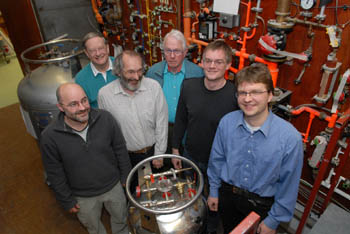Low Temperature Physicist Scoops Young Scientist Prize

Lancaster University’s Ultra-Low Temperature Group are from Left to Right: Prof. Shaun Fisher, Emeritus Prof. Tony Guénault, Dr. Ian Bradley, Prof George Pickett, FRS; Dr. Richard Haley and Dr. Viktor Tsepelin. For further information on the Group go to: http://www.lancs.ac.uk/depts/spc/research/condmatt/ult/index.htm
A Lancaster University Physicist has been awarded a prestigious international award for young scientists.
Dr Viktor Tsepelin, 34, a member of Lancaster University’s internationally-recognised Ultra Low Temperature Physics group, has been awarded the honour by the International Union of Pure and Applied Physics (IUPAP).
He will be awarded The Young Scientist Prize in Low Temperature Physics in Amsterdam this August together with Drs. Dai Aoki (Institute for Nanoscience and Cryogenics (INAC), Grenoble) and Kostya Novoselov (Manchester University) .
The Estonian-born scientist first took an interest in science as a small boy when his Father - a military engineer – brought home pieces of old radio kit for his son to take apart and solder together. And thanks to his Mother enrolling him into school a year early he began university aged just 16.
His fast track through the rungs of academia began in Tartu University in Estonia where he completed a four year BSc in Physics, followed by a two year Masters Degree.
Then he moved on to the Helsinki University’s Low Temperature Laboratory to complete a five year PhD.
In 2001, he finished his PhD and, aged 27, he went to Stanford University as a Post Doctorate Researcher in Superfluid Helium 3 with Nobel Prize Winning Physicist Professor Douglas Osheroff.
After three years at Stanford, Dr Tsepelin moved to Lancaster University where he now lectures, and in 2006 he was awarded a five year EPSRC Advanced Research fellowship in Quantum Turbulence.
Dr Tsepelin said: “I came to Lancaster because it is the best place to do Low Temperature Physics - it’s a very strong laboratory.
“Low Temperature Physics is a fascinating area of research – by cooling substances to temperatures close to absolute zero we are able to study fundamental matter in a unique state. Working at this level we are making new discoveries about how our world works.
“Our community is small and in order to make progress you need a critical mass of people working together and Lancaster has that critical mass. Lancaster is a wonderful place to live and work – I have travelled a lot and I know you can make a home anywhere but Lancaster is special.”
Dr Tsepelin is married with two small children and lives in Lancaster.